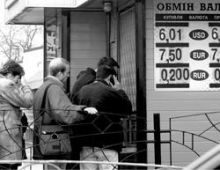The greater the number of politicians determined to rescue Ukraine, the lower the hryvnia’s exchange rate. On Oct. 27, Petro Symonenko, the leader of the Communist Party of Ukraine, added his bill to six others that have been submitted to the Verkhovna Rada: by Ksenia Liapina (NU-NS), Serhii Teriokhin (BYuT), the Cabinet of Ministers of Ukraine (most likely the BYuT’s brainchild), Viktor Yanukovych and Mykola Azarov (Party of the Regions), Stanislav Arzhevitin and Roman Tkach (NU-NS), and Arsenii Yatseniuk (NU-NS).
Only a week has elapsed since the registration date of the first one (Liapina’s) on Oct. 21, and the last one (Symonenko’s) on Oct. 27 [the Ukrainian-language article was originally published on Oct. 29 — Ed.]. But during this period the hryvnia’s official exchange rate dropped from UAH 04.98/01.00 USD to UAH 05.35/ 01.00 USD. American dollars are being sold on the interbank market and at currency exchange bureaus at a steady UAH 06.00/01.00 USD rate. The first conclusion that emerges from an analysis of this situation is that the more plans are drawn up to rescue Ukraine’s national currency, the weaker its position.
The correct approach would be to analyze all these bills, but the Ukrainian parliament is not likely to pass any of them in their present form. The Verkhovna Rada will traditionally come up with a trade-off option. At least, this has been standard practice until now. There is, however, another interesting aspect. In the course of the debates on anticrisis measures, Speaker Arsenii Yatseniuk got one another chance to resolve a financial crisis.
During the 2005 presidential elections, the UAH/USD exchange rate was also jumping off the scale. The National Bank of Ukraine (NBU) introduced daily limits on cash withdrawals from ATMs. Citizens were generally not aware of the National Bank’s other preventive measures. The panic abated, and the situation on the currency market quickly stabilized. Yatseniuk was the head of the NBU.
Today, despite all the complications, Ukraine is still not on the verge of civil war, as it was in 2005. So it would seem that the hryvnia rate should be steadier, yet it has dropped by 25 percent. Of course, one of the causes is the world financial crisis, which did not exist four years ago. But there is another reason: the ability of Volodymyr Stelmakh, the 70-year-old current chairman of the board of the National Bank of Ukraine, and Arsenii Yatseniuk to react quickly and correctly in 2005.
Yet if you take a closer look at this factor, which at first glance explains everything very easily, is not the main one. The reason behind the current crisis is the inadequate and unconsolidated stand of the political leadership, which noticed the global financial decline only once it had crept up to Ukraine.
In December 2005 bank depositors realized that there was no government in Ukraine, but they knew that one would appear before long, and one of the two presidential candidates would become head of state. That is why for bankers and depositors the National Bank of Ukraine was the only real power on the financial market, and through their joint efforts, with the NBU as the sole leader on the market, they succeeded in preventing a crisis.
The current situation is exactly the opposite. Everyone is struggling to overcome the crisis: the NBU, the Cabinet of Ministers, and parliament, although each is going about it in its own way. Let’s not forget about the president’s edicts and the resolutions of the National Security and Defense Council instructing the government on how to combat the crisis. The president’s statement to the effect that he is taking the financial situation in Ukraine under his control means that neither the cabinet nor the NSDC are coping with it.
Naturally, Ukraine’s parliament, like Fuchs, has more than one anticrisis action plan. The problem is that even if Yatseniuk manages to recall the good old NBU days and push a truly good plan through parliament, the very next day after its adoption we will remember that no laws, whether good or bad ones, are being observed in Ukraine now.
Our president resolves to hold early parliamentary elections, but the cabinet has its own excellent plan for the early presidential elections and refuses to finance the parliamentary elections. According to the ideologues of the constitutional reform, the Verkhovna Rada, which appoints the government and governs the country in critical political situations, in fact has become a hostage to the very executive branch that it appoints.
Long ago some economists warned that the conflict between the branches of power constitutes the biggest threat to our country. The worst consequences of the global recession in its acute form — the plummeting hryvnia exchange rate — could have been overcome long ago if the Ukrainian government had listened to their advice not to destroy the Ukrainian economy’s excellent progress by domestic politics, which are now deadlocked.
Infrastructure investments linked to Euro-2012, the construction of affordable housing with government participation, and stabilization loans from world financial institutions can — and surely will — revive the Ukrainian economy’s dynamics and openness. But for this to happen the government must stop fighting its own people, because its political opponents are the people. Understanding this is more important than understanding what will or will not be included in the anticrisis action plan; how deeply foreign capital has penetrated the Ukrainian banking system; the reason behind the NBU’s belated detection of accumulation accounts and equating them to deposit accounts; and why the NBU Council and its boards have two different views on the causes and ways of overcoming this crisis.
All told, none of this is very important because in its search for friends and enemies the Ukrainian government does not need economists so much as a mirror.







